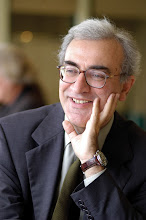A propósito das questões levantadas no meu artigo desta semana no Jornal de Negócios, faz sentido recordar o que escreveu David Goldblatt em Dezembro de 2007 na Prospect inglesa:
In sport, as in so many other areas, we seem to have accepted the triumph of private capital and global markets as irreversible. The private ownership of British football clubs, often by foreign billionaires, may appear to be a fait accompli, but it remains a flawed model. After all, what is a club? Stadiums, players, coaches and directors can and do change, and yet Arsenal is still Arsenal. What gives Arsenal continuity is the accumulated social capital amassed by generations who have attached significance to the narratives generated by the team's performances. This network of memories, meanings, identities and rituals constitute a precious form of value which cannot be owned by anyone and should not have its fortunes exclusively linked to the vagaries of private capital—just ask people in Brooklyn how they feel about the Dodgers' flight to Los Angeles in 1958.
At least in the US, private ownership of franchises is coupled with the regulatory mechanisms of the major leagues—salary caps, revenue-sharing agreements and a player draft system that favours the weak. British football has fewer of these safeguards and, as a result, both the English and Scottish premier leagues are among the most unequal and therefore predictable in the world; the same small group of teams that can afford to pay the ever-rising wage bill win every year. (The Premier League does redistribute about £128m a year to the lower divisions, but this is a tiny proportion of its £2.2bn television deal.) Meanwhile, ticket prices soar—an average Premier League ticket costs around £30—and many ordinary fans are priced out; witness the empty seats at clubs like Bolton and Middlesbrough. Even the US supreme court, hardly a bastion of social democracy, has recognised that sport cannot be regulated as a normal economic sector.
Michel Platini's Uefa and the EU have sought to address some of these problems with proposals for salary restrictions, limits on foreign players, spreading Champions League money more evenly and enshrining sport's distinct status in EU legalisation. But we also need to re-examine the whole question of ownership in sport. We should consider placing stricter limits on private investment in clubs (as in France and Germany) or making it easier to experiment with other forms of ownership, such as the fan-owned model in Spain, where senior club officials are elected. Terrified of appearing too influenced by a European initiative, the British government has been dismissive of the Platini plan, yet it shares many of the same concerns. It has, for example, been promoting supporters' trusts to give the ordinary fan a voice in the boardroom of clubs both big and small. It has also been backing innovative study centres at professional football clubs, with the clubs providing the space and glamour—but not the teaching—to help engage the hardest to reach children.
We need to balance private capital's opportunity to make profits from football with its duties of care. The argument begins with the link between professional sport and the wider sporting culture of society—pub teams, school sports, youth leagues, participating, watching, following and talking. Without this sub-stratum, sport at the highest level would be impossible. All professional sports organisations should bear considerable responsibility for their bases.
30.5.08
Subscrever:
Enviar feedback (Atom)




Sem comentários:
Enviar um comentário